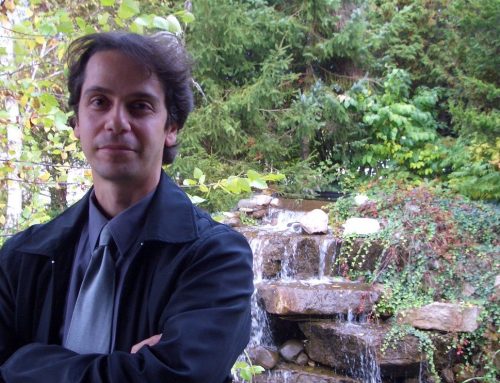On Friday, April 5th, 2013 Dr. Wendy Parker from Ohio University visited the Rotman Institute. Dr. Parker’s main research interests include models and computer simulation in science (especially climate modeling), science and public policy, and the history of atmospheric science and meteorology. In her Rotman Speaker Series lecture, “Beyond Prediction: The Computer as ‘Inductive Device’ in the Study of Weather and Climate,” Dr. Parker discussed the ways in which computer models and simulations can affect our scientific understanding.
Before her lecture, Dr. Parker kindly agreed to an interview with Rotman Institute graduate student, Martin Vezér.
Martin Vezér: What do you think the relevance is of philosophy of science for climate science, and how can philosophers contribute to discussions about climate science?
Wendy Parker: Philosophers of science can contribute by engaging with methodological questions that climate scientists themselves are thinking about. I think there is room to explore how familiar issues in general philosophy of science play out in climate science, too. But I think the real action is in rolling up one’s sleeves, getting into the science, and thinking about the methodological questions stemming from the science itself.
MV: What are some examples of the methodological questions that philosophers deal with related to climate science?
WP: Questions like: How do we determinethe quality of different computer simulation models of the climate system? How do we gauge the trustworthiness of predictions? These are epistemological questions, but they are also rooted in questions about the methodology. How are these models produced? How did they generate the predictions? Also, there are some interesting methodological questions related tothe production of global datasets and their relation to more traditional observational datasets.
MV: Are there certain discussions in the public sphere that deal with epistemological questions that you think philosophers can help clarify, especially with respect to the climate change?
WP: Two things that come to mind immediately are [1] discussions surrounding computer models as sources of information, and [2] discussions of evidence regarding the causes of climate change.
[1] It is sometimes suggested that if findings come from a computer model then they must not be trustworthy. Philosophers can help explain why that’s not so, why some reasons given for doubting modeling results are not good ones, and so on.
[2] Philosophers can also help to clarify why asking whether it’s been “proven” that climate change is caused by humans is somewhat misguided—why “proof” is not the right concept here. We have evidence that climate change is caused by humans, but proof is not really the sort of thing that science can provide—about climate change or anything else—at least not proof as some people understand it. Naomi Oreskes (and a few others) have written some on this.
MV: Speaking of other sciences, do you see the issues that you are researching with respect to meteorology and climatology as being unique to those disciplines? Or are they broader issues that reach into
other sciences as well?
WP: In many cases, they’re broader issues. There are questions about the epistemology of simulation that come up in any science that uses simulation. How should we think about what we’re doing when we’re simulating something, what can it really tell us, and what can it not tell us? Also, I think that the questions and challenges that arise when examining how we come to understand a complex system like the climate system also arise in other sciences that study complex systems, such as ecology and biology.
It’s always risky to claim that some problem is unique! But I think there are some special, maybe even unique issues here. Just as philosophy of physics and philosophy of biology have grappled with the basic concepts of these sciences, there are some fundamental concepts of climate science that seem to me in need of further attention. These include concepts like natural variability and even climate itself. It seems to me that some definitions of ‘climate’ are in conflict with each other, and some might not apply when a planet is undergoing strong external forcing.
MV: How have you found your experience dealing with scientists? Are they open to input from philosophers, and are they themselves engaging with these kinds of issues?
WP: My experience has been that atmospheric scientists and climate scientists are pretty welcoming of philosophers. And yes, they’re absolutely thinking about some of these issues. For instance, there is ongoing discussion of how to assess the quality of climate models (in general) and whether projections from some climate models should be given more weight than others.
MV: What advice would you give philosophy students and young scholars interested in climate science? How should they go about using their training to engage with some of these topics in philosophy of climate science?
WP: I would say to learn the science, learn as much of the science as you can and, in some sense, start from the science. You may be tempted to start with philosophical problems you know and bring them to the science; that’s one way to approach it. I think a better way is to start with whatever methodological and epistemological issues the climate scientists themselves are worrying about. A third thing would be to avoid thinking that it’s your job to tell scientists what they’re “doing wrong”—that’s more likely to impede philosophers’ making contributions, in my opinion.
MV: Are there particular topics that you see as becoming more and more the focus of the philosophical side of climate science, among scientists as well as philosophers?
WP: I still think that model evaluation and questions of evidence are the really big ones. But I would add questions about the role of so-called ‘non-epistemic’ values in climate modeling: where in the modeling process do such values appropriately come into play, and how can model development be more responsive to the (value-influenced) information needs of users? Eric Winsberg already has argued that non-epistemic values influence model-based uncertainty estimates here in subtle ways. But other questions about values in modeling are in need of attention.
MV: Thank you, Wendy! We very much appreciate your visiting the Rotman Institute of Philosophy and sharing your thoughts with us.
WP: You’re welcome!
[Also, thanks to Melissa Jacquart for her assistance in the initial transcription of this interview and editorial contributions.]






